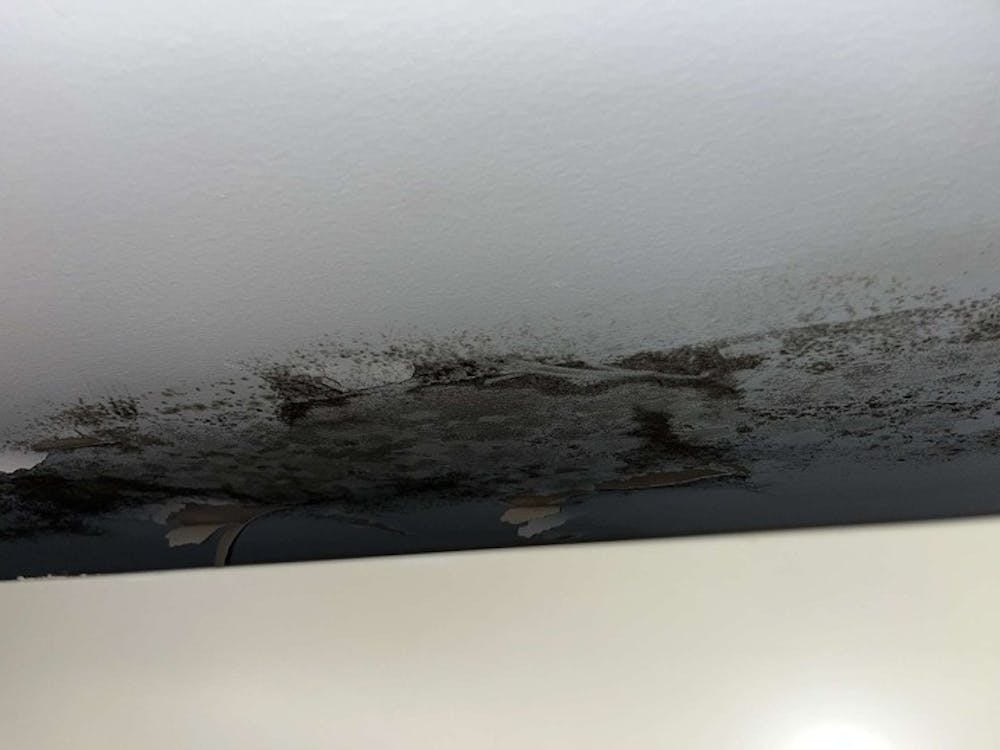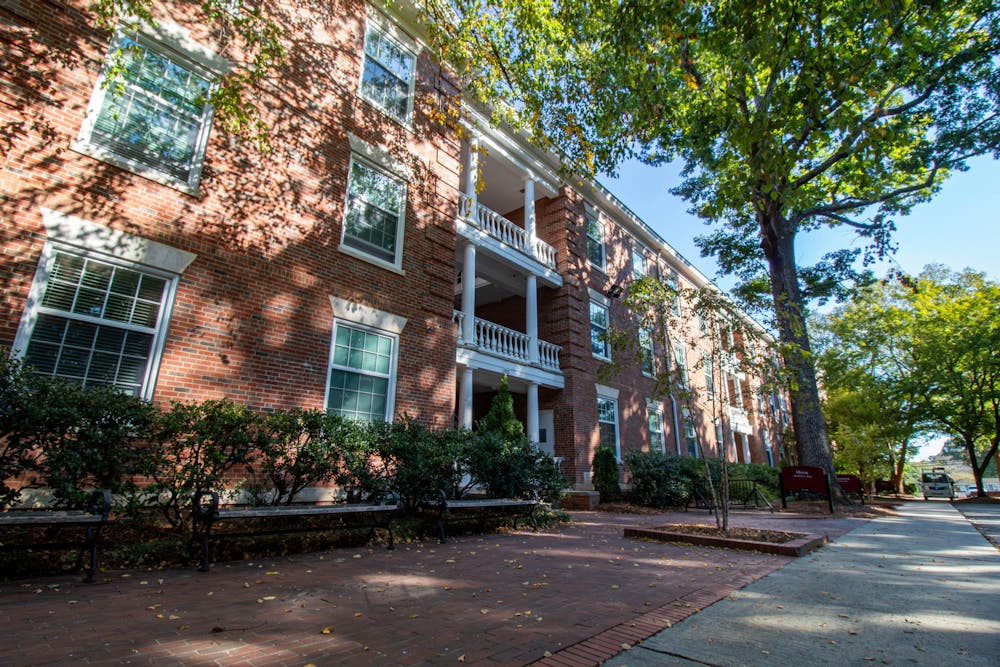Elon University’s Historic Neighborhood dates back to 1889, so it shouldn't come as a shock the buildings need occasional maintenance.
Despite recent renovations, Hook, Brannock and Barney — otherwise known among students as HBB — has a history of mold reports, and this year is no different. On Sept. 26, eight third floor Brannock residents were informed in an email from the Historic Neighborhood Community Director Jordyn Williams that they were being reallocated throughout Historic and Colonnades so their rooms could be rid of mold.

According to the Environmental Protection Agency's website, mold is a type of fungi that can grow anywhere moisture and oxygen are present and is spread by the production of reproductive cells called spores. Mold typically grows on absorbent pores materials such as wood, paper, carpet, food, and insulation and can grow virtually anywhere.
According to the report sent to those who had to be relocated, the mold found in upstairs Brannock is the species aspergillus/penicillium, which can cause infections in lungs and sinuses in people with weak immune systems, according to the Centers of Disease Prevention and Control.
Senior Director of Facilities Management Raymond Fletcher has been working at Elon for five years and is responsible for operating and maintaining the university’s facilities and infrastructure.
Fletcher wrote mold can grow anywhere so facilities management focuses on prevention.
“Having a good maintenance program that maintains the appropriate equipment and repairs or replaces as they fail, is our best way of preventing this from becoming an issue for students, faculty, and staff,” Fletcher wrote in an email to Elon News Network. “We are always working to stay on top of mildew and mold issues in our facilities. We respond quickly when we get mold related work orders to ensure that the facility is safe for occupancy and to clean up or remediate if necessary.”
The EPA’s website said the key to reducing potential for mold moisture control, such as a dehumidifier, can be helpful for decreasing moisture in small spaces, such as dorm rooms.
Fletcher said facilities management has several processes in place to mitigate mold on campus.
“A big part of our prevention method is maintaining our HVAC systems, fixing roof or pipe leaks as they are discovered, conducting routine preventative maintenance, and responding to work orders in a timely manner helps us keep mold growth in check,” Fletcher wrote.
In late August, the Alamance-Burlington School System had to delay the start of the school year until Sept. 11 because of a failed HVAC system causing moisture to build up in the air, resulting in a toxic mold infestation and costing the district over $3.9 million to repair buildings. Over 30 schools in the district had mold issues according to a press release issued by ABSS.
The affected ABSS buildings date back over 50 years, which can contribute to the mold growth which has led to some much needed renovations of some ABSS facilities. Elon’s campus is about 134 years old and in recent years has also begun to renovate some of its older buildings such as HBB.
But even with renovations in HBB, including a new water line installation this past summer — which is responsible for bringing clean water to the building — and a dehumidification system being installed within the past four years, Brannock residents have still discovered mold in their rooms.
Freshman and first floor Brannock resident Reagan Tanner said she had no idea moving in that HBB has a history of mold and didn’t think there was any reason to be concerned.
“Probably a week or two after we moved in the pipe started condensating and it was leaking on my bed and I looked up and I saw mold,” Tanner said. “I was just like, well full-on disgusted, because mold just condensating and dripping down on my bed is freaking gross.”
When students need any sort of repairs done it is recommended by the university that they file a report withFix-It, a website available to Elon students and faculty to report maintenance issues in campus facilities to facilities management. Reports can also be made to the facilities management trouble desk by calling (336)2785500.
There are different protocols in place depending what the issue reported is. When it comes to mold, Elon’s HVACR team has to first test the mold before any decisions on how best to remove it can be made. According to Fletcher removal can be as simple as a surface wipe down or as serious as full remediation depending on the type of mold and how much of it has spread.
“If remediation is required, we use a third-party remediation company to conduct the cleanup,” Fletcher wrote. “A full remediation typically would require the student, faculty or staff member to be displaced from their room or office during the cleaning process which would include HEPA air filters, surface wipe down, cleaning of the HVAC system, removal or replacement of damaged sheetrock and a final air quality test to ensure that the mold has been remediated or removed from the room or building.”
However, while Tanner tried multiple times to access the Fix-It website, she said she never submitted a Fix-It report.
“Fix-It report form has not been working for me at all,” Tanner said. “I don’t even know how to react because I was just full on like, ‘Holy cow, this is actually real’ and then I got sick”
According to the CDC's website, mold exposure can cause a variety of health effects on certain groups such as stuffy nose, wheezing and red or itchy eyes and or skin.
While not confirmed Tanner attribute’s her case of what many students call the freshman flu — referring to when majority of first year students begin to get sick at the start of the semester — to the mildew found in her dorm.
“I’ve been sick for like two weeks now, it’s not COVID. I have swollen tonsils, but it's tonsillitis. But it’s often because of bacteria,” Tanner said. “My suitemate had a bacterial pink eye from where they had gotten sick.”
After Brannock’s residents moved out Sept. 27, the cleaning company First Call Cleaning & Restoration arrived at HBB to close off the third floor of Brannock and began the mold removal process and inspected the remaining two floors for mold.
“The mold was so bad in their dorm that the entire suite was sick. And it was just got to the point where they had reported it over and over again.” Tanner said. “They’ve moved them out for two to three weeks and they’re cleaning their dorms.”
While Brannock's third floor is currently the only suites that Tanner knows to have been reallocated, her dorm on the first floor was also marked as having mold.
“They emailed us yesterday about spraying vital oxide, which is a mold remediation thing and told us it was a small mildew problem,” Tanner said.
According to the EPA, mildew refers to a certain kind of mold or fungus that typically isn’t considered harmful but that may have a foul odor. Mildew can also be described as more white and flat as opposed to fuzzy. The two fungi are treated differently so if there is any confusion about whether it is mold or mildew present experts recommend getting the fungus tested.
Brannock isn’t the only building that has had its share of run-ins with Facilities Management.
Sophomore Evie Gannon lived in Barney during her freshman year and said she could smell the mold.
“I’m not shocked that there’s mold in Brannock and people had to move. I’m really not shocked. I feel like that’s just how HBB is,” Gannon said. “There were always smells there. There are always smells going on.”
However, Gannon said she also never made any reports to Fix-It.
“I never reported anything to Fix-It. Mainly because I didn't know how to Fix-It. Now and then I think about it like, ‘Oh, I should have really submitted something,’” Gannon said. “I'd be very concerned but also at the same time really tired and be like ‘I don't really want to deal with this right now,’ it was like ‘Out of sight, out of mind.’”
Though Elon’s Historic Neighborhood has much sentimental value, Tanner said she’s unsure if the work required to maintain HBB is worth it.
“It's just like it has nothing to do with Historic, the locations are incredible. The office is incredible. The Historic Neighborhood Association is awesome. It's just the dorms itself right now are not up to par for what we paid for,” Tanner said. “I feel like there's so many issues with that building. They just need to tear it down and build it back up.”


